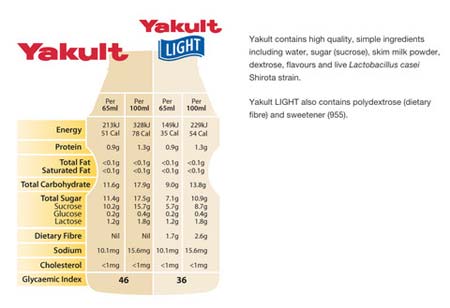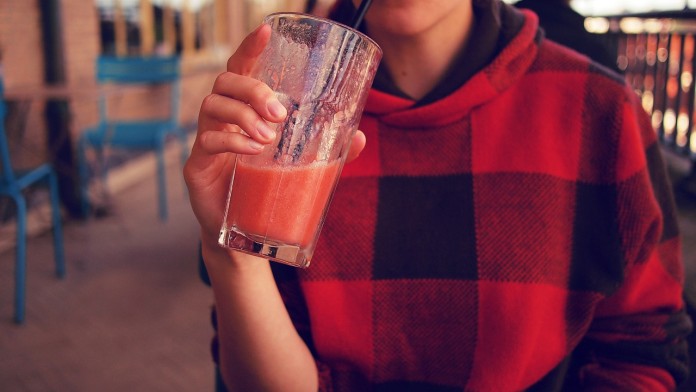The more we learn about gut health the more we realise that consuming probiotics on a regular basis have a host of benefits for our health. Product marketers have also recognised this and today we’re flooded with advertising about various probiotic drinks, supplements or foods. Sure we should be consuming helpful gut bacteria, but are these probiotic drinks the best way to introduce extra beneficial bugs into your belly?
Let’s take a look at 11 reasons why you shouldn’t be drinking probiotic drinks using a popular example, Yakult

1) Sugar
The first ingredient is water; second on the list is sugar (sucrose). If we look at the nutrition label, we can see that the standard Yakult probiotic drink has 10.2grams of sucrose (that’s standard cane sugar) per serve! The 15.7grams per 100mls is HIGHER than that of Coca-Cola! If you think you’re safe as you only use the Light version of Yakult, think again. It’s only 30% less sugar. You’re still receiving 1.5 teaspoons of pure cane sugar per serve!
2) Skim Milk Powder
The second ingredient on the list is skim milk powder. Skim milk powder is a horrible food source not only because all the nutritious fat has been ‘skimmed off’, but because of the heat treatment the milk receives to turn it into powder form. This turns a healthy nutritious food into an inflammation health bomb.
3) Dextrose – More Sugar
The third ingredient in the popular probiotic drink Yakult is Dextrose. Dextrose is a simple sugar, and in Yakults’ case, is derived from tapioca. Not quite as bad as the standard sucrose sugar (due to the lack of fructose molecule) however, it is still a simple carbohydrate.
4) Ultra Heat Treated
High Temperature treatment of milk destroys milk proteins and can lead to autoimmune issues. The Food Renegade looks at the harmful effects of UHT in this blog post – Just Say No To UHT Milk.
The damaging effects of UHT can be summed up with this quote:
According to Lee Dexter, microbiologist and owner of White Egret Farm goat dairy in Austin, Texas, ultra-pasteurization is an extremely harmful process to inflict on the fragile components of milk. Dexter explains that milk proteins are complex, three-dimensional molecules, like tinker toys. They are broken down and digested when special enzymes fit into the parts that stick out. Rapid heat treatments like pasteurization, and especially ultra-pasteurization, actually flatten the molecules so the enzymes cannot do their work. If such proteins pass into the bloodstream (a frequent occurrence in those suffering from “leaky gut,” a condition that can be brought on by drinking processed commercial milk), the body perceives them as foreign proteins and mounts an immune response. That means a chronically overstressed immune system and much less energy available for growth and repair.
5) Homogenisation
Though not as bad as high heat treatment, homogenization still destroys milk molecules. We’re worried about the impact that this homogenization process has on the milk and on our body.
This is a great quote from the Weston A Price website:
“We have observed that pasteurization, ultra-pasteurization, and homogenization impact the colloidal structure of milk, altering its organizational integrity. … Homogenization affects the integrity of the fat globules, rendering them smaller and more uniform, and thus, alters raw milk’s colloidal ultrastructure, too.”
6) Artificial Sweeteners
Yakult Light uses 30% less sugar than the regular Yakult. However, there are still 1.5 teaspoons in that tiny shot glass sized serve. Now artificial sweeteners are a controversial topic. Some people believe they are linked to all sorts of illnesses including cancer, whereas others think they are safe. Personally, I avoid them where possible.
Why not avoid it all together? Why risk potential dangers from an artificial chemical, when you can eat real food and achieve the same benefit, or even use a supplement and avoid the sugar and the chemicals?
7) Plastic Bottles
According to Yakults website:
Yakult’s unique-shaped plastic bottles are produced on-site from triple food grade polystyrene pellets using injection blow-moulding machines. Pellets are melted and injected under pressure onto ‘core’ rods.
That’s just great. Plastics have been shown to leech into food products and disrupt our endocrine system, impact our hormonal and reproductive systems, and have even been linked to cancer and neurological damage (source – Harmful Plastics). As per reason 6, why even put yourself through the risk? Eat real food or pop a tablet instead.
8) Flavouring
Looking back at the ingredient list we see ‘Flavours’. Is this really required? We have enough sugar in there to make it palatable to even the fussiest eater. I know taste is important for a products success, but my concerns are:
- What actually is this ‘flavouring’ ingredient? I’m pretty sure they’re not squeezing organic lemon juice into each bottle.
- It brings me to the question again – why get your probiotics in drink format with all the sugar, processed milk and added ‘flavours’, why not just take a tablet and receive all same benefits.
9) Convenience
Probiotic drinks such as Yakult require constant cold temperature storage. A lot of the top quality probiotic supplements on the market such as Thorne Floramend are heat stable and do not require refrigeration.
However, occasionally I don’t have any in pantry, or perhaps I’m away travelling for a few days. This is where the supplement form comes in handy. It’s heat stable so I can throw the container in my suitcase and know that my gut will be well looked after no matter where I am.
10) Effectiveness
My final point – although probiotics are very important for optimal gut health, and there are some studies showing the effectiveness of Yakult’s patented L. casei Shirota strain, it may not be the “wonder strain” that it’s made out to be.
This taken from Suppversity:
Probiotic supplements don’t cure everything – although many ads may give just this impression. In a recently published study, Swiss researchers were not able to show any beneficial effects of the patented L. casei Shirota strain on the increased gut permeability of 28 patients with metabolic syndrome (Leber. 2012). In the course of the three months study period, it rather exasperated the already elevated C-reactive protein levels, due to liposaccharide leakage through the leaky gut into the system and I bet the only reason that the conclusion states that the dosage may have been too low instead of “this is initial evidence that the use of L. casei Shirota is not useful if not counter-indicated in to treat gut permeability in patients with MetS”, was the financial support by Yakult Europe the patent holder of L. casei Shirota
Do you drink daily Probiotic drinks? Were you aware of all the sugar in them? And after reading this, will you continue to buy them? I’d love to know your thoughts after reading this blog.

![5 Reasons You Should Travel Alone Airplane [image source: chau nguyen/ http://thedevilhatessweatpants.blogspot.com.au ], crowd ink, crowdink, crowdink.com, crowdink.com.au](https://crowdink.com/wp-content/uploads/2016/08/Chau-airplane-218x150.jpg)





























![5 Reasons You Should Travel Alone Airplane [image source: chau nguyen/ http://thedevilhatessweatpants.blogspot.com.au ], crowd ink, crowdink, crowdink.com, crowdink.com.au](https://crowdink.com/wp-content/uploads/2016/08/Chau-airplane-100x70.jpg)


